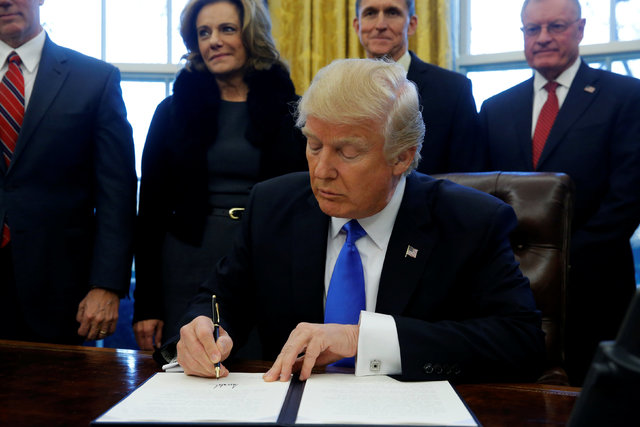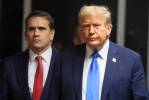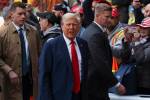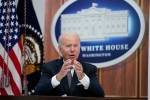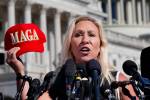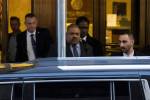President Donald Trump’s flawed executive order sparks debate over safety from terrorism
That didn’t take very long.
President Donald Trump’s administration is just 13 days old, and already we’ve seen a constitutional crisis, a fired acting attorney general and chaos.
Trump’s executive temporarily order banning immigrants from seven predominantly Muslim nations in the name of fighting terrorism inflamed Democrats and raised constitutional questions. It’s as if everybody was amazed that Trump had the audacity to sign an order embodying the very things he advocated on the campaign trail!
But Trump may have turned fealty to campaign promises into a morally neutral virtue, given that the order may offend the First Amendment’s Establishment Clause, the 14th Amendment’s due process clause and portions of the very Immigration and Naturalization Act (as amended) that Trump cited in his order.
It’s worth noting, however, that more than a few legal authorities defend the order as constitutionally sound, citing not only the president’s broad powers to conduct foreign relations, but also the specific portion of immigration and law that empowers him to suspend the entry of all “aliens or classes of aliens” if he finds that such entry is detrimental to the interests of the United States.
Members of Nevada’s delegation were virtually united against the move.
Rep. Ruben Kihuen condemned it for religious discrimination. (The order doesn’t ban all Muslims, however, or even Muslims from nations the Sept. 11 hijackers called home.) Rep. Dina Titus condemned closing the door on refugees fleeing persecution and possible death. Rep. Jacky Rosen decried the haphazard way in which the order was implemented, trapping even lawful permanent residents in its dragnet. Rep. Mark Amodei, Trump’s 2016 state chairman, said the order at least attempts to address a problem left festering by Congress. Sen. Catherine Cortez Masto said the “unconstitutional” order would make the country less safe. And Sen. Dean Heller said he was troubled by the overly broad order’s “appearance of a religious ban,” adding it was not the way to ensure national security.
That last point may be the most salient. Although Trump’s order explicitly defines its purpose — “to protect the American people from terrorist attacks by foreign nationals admitted to the United States” — it’s questionable whether the order will achieve that goal.
More than a few opponents have declared the edict will serve only to reinforce the idea that America is at war against Islam, rather than those who believe Islam compels them to kill in the name of God. Even new Secretary of Defense James Mattis is said to be preparing a personal appeal to Trump to exempt Iraqi nationals who have fought beside U.S. troops in that nation.
The provisions of the order set a high goal: identify those who don’t support the Constitution, those who would put “violent ideologies” over American law, those who are at risk of causing harm if they’re admitted, and those who have a likelihood of contributing to the society versus those who do not. Trump has called for “extreme vetting,” but there’s no guarantee that will intercept the committed jihadist. If a person is willing to murder innocents because of his beliefs, what’s telling a lie to an immigration officer by comparison? And how will we design an interview to determine whether a person who appears normal today may later become radicalized?
That’s the dilemma: We cannot surrender and accept that a certain percentage of bad actors will enter the country. But we also cannot raise the drawbridge to America, especially if the underlying policy could arguably violate the Constitution.
President Trump wants to keep the country safe. So, too, do the critics of his executive order. The outcry over that order has shown that neither side has yet devised a way to reach that goal effectively, intelligently and legally.
Steve Sebelius is a Review-Journal political columnist. Follow him on Twitter (@SteveSebelius) or reach him at 702-387-5276 or SSebelius@reviewjournal.com.



